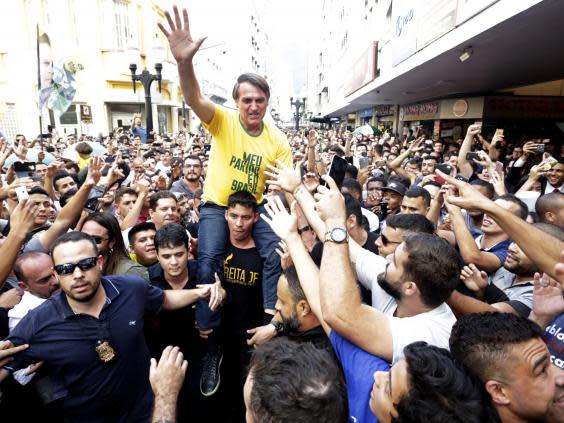Who is Jair Bolsonaro? Brazil's new president is far-right congressman dubbed 'Trump of the Tropics'
Jair Bolsonaro – the far-right congressman who became Brazil’s president-elect in January – has been dubbed “Trump of the Tropics” by the Brazilian media for his outrageous views.
Just as Donald Trump’s detractors dismissed him as unelectable back in 2016, Mr Bolsonaro’s opponents believed the far-right figurehead would be too toxic to win.
The outsider congressman, representing the tiny Social Liberal Party, managed to win widespread support by promising to lock up crooked politicians and make it easier for police to shoot drug traffickers.
He won just over 55 per cent of the votes in the election.
Shortly after being elected, he signed a decree that loosened gun ownership restrictions and made it easier for citizens to keep a firearm at home – in a country that has one of the world’s highest murder rates.
This move came under fire on 14 March, when at least 10 people, including six children, were killed in a shooting at a school in Sao Paulo.
At least 17 other people, mostly pupils, were also injured.
He also recently received widespread condemnation after sharing an explicit video on Twitter – reportedly filmed at Sao Paulo’s annual street festival – in which a man is seeing urinating on another person.
He later tweeted: “What is a golden shower?”
It was seen an attempt to discredit carnival-goers, many of whom protested Mr Bolsonaro’s anti-LGBT+ policies and a money laundering scandal involving the president and his personal driver.
Brazilians at the time were quick to condemn Mr Bolsonaro’s tweet as a gross misrepresentation of the festival.
In an interview with Fox News host Shannon Bream, he attempted to justify the sharing of the video, saying that it was already on the internet and “We just shared it to try to showcase how way off track carnival is going in Brazil”.
In the same interview, he also appeared to defend Mr Trump’s proposed border wall across the US-Mexico border.
“The vast majority of potential immigrants do not have good intentions or do not intend to do the best or do good to the US people,” Mr Bolsonaro said, without providing evidence.
He also echoed his US counterpart when he dubbed Brazil’s mainstream media “fake news” and claimed it is “virtually dominated by the left-wing”.
The ex-army captain has expressed his support for torture, spoke fondly of Brazil’s past military dictatorship, and said socialists would have to go overseas or go to jail if he won.
Although his campaign tapped into a desire to crack down on rising crime and anger at the political class, many Brazilians remain sickened by Mr Bolsonaro’s promises to purge political opponents.
Human rights groups and defeated left-wing rival Fernando Haddad have warned of a possible crackdown on civil liberties as the president-elect assumes power.
Anti-Bolsonaro activists also loathe his long history of offensive remarks about women, immigrants, black Brazilians and gay people.
He twice told a female colleague in Congress she was too “ugly” to be raped, and said a dead son was preferable to a gay one.
He also vowed to revise school textbooks to remove references to feminism, homosexuality and violence against women.
“One of the goals to get Brazil out of the worst positions in international education rankings is to combat the Marxist rubbish that has spread in educational institutions,” Mr Bolsonaro tweeted on the eve of his inauguration.

In a speech made last year, Mr Bolsonaro spoke about a black settlement in Brazil founded by the descendants of slaves.
“They do nothing. They are not even good for procreation,” he said.
In an interview with Playboy magazine in 2011, Bolsonaro said that he “would be incapable of loving a homosexual son.”
He added: “I would prefer my son to die in an accident than show up with a moustachioed man.”
The politician has direct experience inside the military dictatorship that ruled Brazil between 1964 and 1985.
He was raised during the military dictatorship that ruled Brazil between 1964 and 1985 and graduated from military academy in 1977, rising to the position of army captain by the time democracy returned in the mid-eighties.
The soldier was arrested in 1986 for signing an article criticising the post-dictatorship military salaries, before leaving the military to enter politics. He first won a seat in Congress in 1990.
The right-winger made law and order a crucial part of his platform during this year’s election campaign.
Although his Workers’ Party opponent Fernando enjoyed an early lead in the campaign, a late surge saw Mr Bolsonaro’s poll numbers rise by 15 per cent after he was stabbed on 6 September.
Despite a three-week stay in hospital, he took his authoritarian message directly to voters via Facebook and Twitter.
He also received endorsements from Brazilian football stars, including Ronaldinho, Cafu and Tottenham's Lucas Moura.
“Bolsonaro is the voice of people who want to speak but don’t feel they can because they fear being politically incorrect,” said Carlos Manhanelli, chairman of the Brazilian Association of Political Consultants.
“He presents himself as he is, and in the minds of voters that is authentic.”
This article was originally published in October 2018
